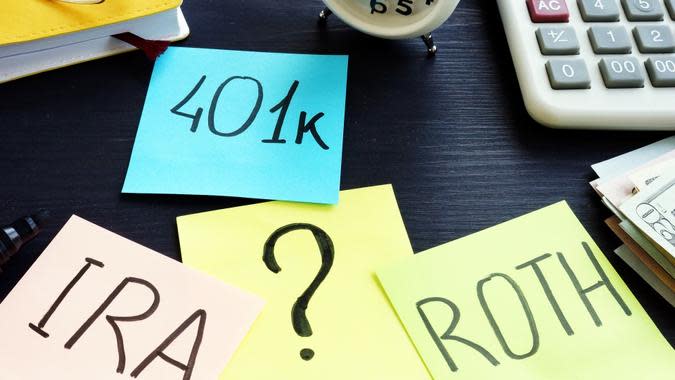One often-overlooked aspect of retirement planning is the effect of taxes. Without proper planning, taxes can take a significant bite out of your nest egg.
Maximize Your Paycheck: Best Banks for Early Direct Deposit
Daily Profits With ChatGPT: Strategies To Make Up To $1,000 a Day
A $1 million dollar portfolio in a 401(k) plan or traditional IRA, for example, might be worth $800,000 or less after taxes. Similarly, if your investments are in a regular, taxable brokerage account, the income that money generates may also be taxable.
One way to work around this problem is to save and invest even more during your working years so that you have extra money to pay your taxes. Another is to be tax-smart with your investments and account choices to reduce your tax liability to an absolute minimum. While many things are surprisingly taxed in retirement, here are several types of retirement income that are not taxable.
Roth Withdrawals
The easiest way to avoid taxes on your retirement money is to use a Roth account. Both IRA and 401(k) plans can be structured as Roth accounts, which don’t offer a tax deduction on contributions but allow tax-free withdrawals after age 59 ½.
Essentially, with a Roth account, you’re paying your taxes upfront at the time that you contribute, rather than owing them on your distributions. While you can’t contribute to a Roth if your income exceeds certain levels — $153,000 for singles or $228,000 for joint filers in 2023 — you can convert your traditional plan to a Roth at any time. However, you’ll have to pay income taxes on the amount of the conversion, just as if you withdrew the money.
For this reason, it typically makes more sense to start a Roth earlier in your career rather than facing a huge tax bill during your peak earning years.
I’m a Financial Expert: Always Buy the Cheapest Version of These 10 Things
Social Security Cuts: States That Would Be Impacted the Least
Inheritances
It’s not usually a good idea to rely on an inheritance as a retirement plan. For starters, receiving an inheritance is never a sure thing, and additionally, the amount bequeathed is rarely enough to fund a long retirement.
However, many Americans do receive an inheritance at some point in their lives, and it can often be a good supplement to existing retirement savings. Financially speaking, the best part of an inheritance is that it is tax-free. Even if there is estate tax involved, which is quite a rarity, beneficiaries are not responsible for paying them.
Retired But Want To Work? Try These 8 Jobs for Seniors That Require Little to No Experience
Municipal Bond Income
Municipal bonds are issued by states, cities and various localities, generally to fund projects like schools, roads and other items that are for the common good. Municipal bonds are granted tax relief at the federal level, meaning investors don’t have to pay federal taxes on the interest earned from any municipal bond.
If you buy a bond issued in your own state, you’re typically granted a tax exemption from state taxes, as well. This makes municipal bonds particularly valuable in high-tax states like California. They can also be a good source of retirement income, as they are generally safe investments in addition to being tax-exempt.
HSA Withdrawals
A health savings account (HSA) combines some of the best features of both traditional and Roth IRAs into a single package. Contributions to an HSA earn a tax deduction, and earnings within the account grow tax-free.
When used for qualifying healthcare expenses, which is a fairly broad category, withdrawals are tax-exempt, as well. Otherwise, you’ll face a steep 20% penalty on your withdrawals. However, the kicker in terms of retirement planning is that once you reach age 65, you can withdraw your HSA money for any reason at all without having to pay a penalty.
When used for non-healthcare purposes, you’ll still face ordinary income tax, but you can avoid the penalty. The best use of an HSA will always be for healthcare expenses, though, as you can withdraw your funds tax-free at any time.
Some Social Security Payments
In many cases, Social Security payments are not taxable, but this is not always the case. If you’re simply living off your Social Security retirement benefits, then it’s true that they are tax-free. However, if you earn over a certain amount, some or even most of your payments become taxable. Here’s how the taxation of Social Security for 2022 breaks down, based on income and filing status:
Individuals with a combined income of $25,000 to $34,000 may have to pay tax on up to 50% of their benefits; those with incomes of over $34,000 may face taxes on up to 85% of their Social Security income.
For joint filers, up to 50% of Social Security income is taxable for incomes between $32,000 and $44,000, with those earning more paying tax on up to 85% of benefits.
The Social Security Administration defines “combined income” as adjusted gross income plus nontaxable interest plus one-half of Social Security benefits.
Florida’s Retirees Are Fleeing: Here’s Where They’re Going Instead
Life Insurance Proceeds
Just like an inheritance, waiting for a life insurance payout isn’t an ideal strategy for funding a retirement plan. However, it’s entirely possible that at some point in your senior years, you will receive some type of life insurance payout.
Often, these distributions are in the hundreds-of-thousands-of-dollars range, so they can significantly impact your retirement savings. And just as with inheritances, life insurance proceeds are tax-free to the recipient, at least when taken in a lump sum rather than installments.
More From GOBankingRates
10 Things Boomers Should Consider Selling in Retirement
11 Uncommon Investments That Can Actually Make You A Lot of Money
3 Things You Must Do When Your Savings Reach $50,000
How to Earn an Extra $500 a Year on Your Savings
This article originally appeared on GOBankingRates.com: Retirement Taxes: These 6 Sources of Retirement Income Are Not Taxable
I'm a financial expert with extensive knowledge in retirement planning and taxation. I've been actively involved in the financial industry, helping individuals make informed decisions about their retirement savings. My expertise is grounded in a thorough understanding of various investment vehicles, tax implications, and strategies to optimize retirement income.
Now, let's delve into the concepts mentioned in the article about retirement taxes:
-
Effect of Taxes on Retirement Planning:
- Taxes can significantly impact the value of a retirement portfolio, potentially reducing it to less than the initial amount.
-
Maximizing Paycheck and Early Direct Deposit:
- The article suggests exploring banks that offer early direct deposit as a strategy to maximize income.
-
Taxation of Investments in Retirement Accounts:
- A $1 million portfolio in a 401(k) or traditional IRA might be worth less after taxes.
- Tax implications on income generated in a regular taxable brokerage account.
-
Tax-Smart Investment Strategies:
- Working around tax issues by saving and investing more during working years.
- Being tax-smart with investments and account choices to minimize tax liability.
-
Types of Retirement Income That Are Not Taxable:
- Roth Withdrawals: Contributions are taxed upfront, but withdrawals are tax-free after age 59 ½.
- Inheritances: Inheritances are tax-free for beneficiaries.
- Municipal Bond Income: Interest earned from municipal bonds is generally tax-exempt at both federal and state levels.
- HSA Withdrawals: Contributions earn a tax deduction, and qualified healthcare expense withdrawals are tax-exempt.
- Some Social Security Payments: Social Security payments may be tax-free, depending on income and filing status.
- Life Insurance Proceeds: Lump-sum life insurance payouts are tax-free to the recipient.
-
Considerations for Retirement Planning:
- Caution against relying solely on inheritances as a retirement plan.
- Highlighting the value of municipal bonds as tax-exempt and safe investments.
- Emphasizing the benefits of starting a Roth account early in one's career.
It's crucial for individuals to be aware of these tax implications and strategically plan their retirement to maximize their income while minimizing tax liabilities. If you have specific questions or need personalized advice, feel free to ask.






